development
-
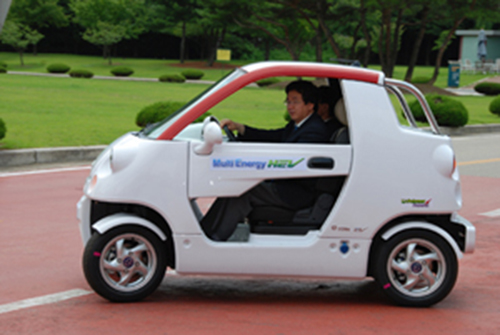 KAIST, CT&T Develop Multi-Energy Hybrid Electric Car
KAIST exchanged a memorandum of understanding for the development and production of a multi-energy plug-in hybrid electric car (ME-PHEV) with CT&T, an electric car maker, on Monday (June 30).
The ME-PHEV is a new vehicle model incorporating a small electric generator and solar energy as power source with conventional plug-in hybrid electric vehicle with rechargeable batteries. The new vehicle has been jointly developed by a research team led by Profs. Soon-Heung Chang and Yong-Hoon Chung, at the department of nuclear and quantum engineering, KAIST, and CT&T.
The ME-PHEV features an increased mileage, improved battery durability and better passenger convenience compared to conventional hybrid vehicles. The joint developers have applied for domestic and international patents.
Prior to the MOU signing ceremony, Prof. Chang, who is also a vice president of KAIST, had a trial ride of the vehicle for the media at the KAIST campus.
"Major car makers of the world currently focus on developing hybrid electric vehicles with battery and internal combustion engine. Compared to these cars, the ME-PHEV offers advantage in terms of reduced air pollution and lowered production costs," said Prof. Chang.
Under the agreement, CT&T will put the features of ME-PHEV into e-Zone, the company"s city-class, low-speed electric vehicle model, with a schedule go into commercial production of the car next year.
2008.07.02 View 17528
KAIST, CT&T Develop Multi-Energy Hybrid Electric Car
KAIST exchanged a memorandum of understanding for the development and production of a multi-energy plug-in hybrid electric car (ME-PHEV) with CT&T, an electric car maker, on Monday (June 30).
The ME-PHEV is a new vehicle model incorporating a small electric generator and solar energy as power source with conventional plug-in hybrid electric vehicle with rechargeable batteries. The new vehicle has been jointly developed by a research team led by Profs. Soon-Heung Chang and Yong-Hoon Chung, at the department of nuclear and quantum engineering, KAIST, and CT&T.
The ME-PHEV features an increased mileage, improved battery durability and better passenger convenience compared to conventional hybrid vehicles. The joint developers have applied for domestic and international patents.
Prior to the MOU signing ceremony, Prof. Chang, who is also a vice president of KAIST, had a trial ride of the vehicle for the media at the KAIST campus.
"Major car makers of the world currently focus on developing hybrid electric vehicles with battery and internal combustion engine. Compared to these cars, the ME-PHEV offers advantage in terms of reduced air pollution and lowered production costs," said Prof. Chang.
Under the agreement, CT&T will put the features of ME-PHEV into e-Zone, the company"s city-class, low-speed electric vehicle model, with a schedule go into commercial production of the car next year.
2008.07.02 View 17528 -
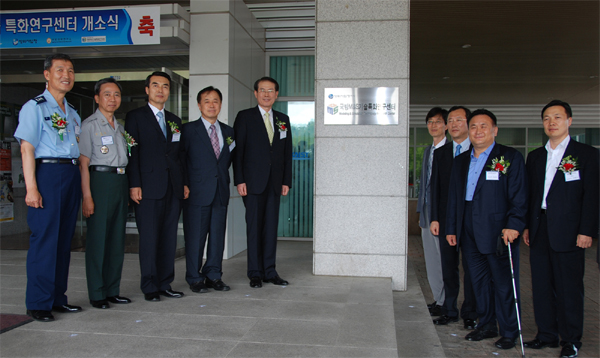 KAIST Opens M&S Technology Research Center
KAIST held an opening ceremony for a new defense research center focusing on modelling & simulation located at its main campus in Daejeon on Thursday (June 19).
The opening of the M&S Technology Research Center is aimed at developing technologies and processes to test, practice and operate newly-developed precision and micro weapons systems in virtual space. The center will be supported by two state-run defense agencies, the Defense Acquisition Program Administration and the Korean Agency for Defense Development.
The new research center is expected to receive a total of 11.5 billion won (US$11.2 million) research grants from the state for the next eight years until 2016. The center will be involved in the development of sophisticated, complex and inter-related weapons system and training research personnel in the specialized area.
The research center will undertake a total of 21 specific projects in collaboration with seven other universities in Korea. Also joining the projects are such overseas institutions as Georgia Institute of Technology and the U.S. Naval Post-Graduate School, and private defense solution providers including Posdata, Samsung Thales and LIG Nex 1.
The opening of the research center comes at a time when modelling and simulation gain growing importance as today"s armies employ more sophisticated, complex and inter-related. weapons systems and equipment than ever before.
Tae-Uk Lee, director of the research center said: "The opening of the center will spur development of operational technologies of precision and micro weapons system on our own, departing from dependence on advanced countries."
2008.06.19 View 19092
KAIST Opens M&S Technology Research Center
KAIST held an opening ceremony for a new defense research center focusing on modelling & simulation located at its main campus in Daejeon on Thursday (June 19).
The opening of the M&S Technology Research Center is aimed at developing technologies and processes to test, practice and operate newly-developed precision and micro weapons systems in virtual space. The center will be supported by two state-run defense agencies, the Defense Acquisition Program Administration and the Korean Agency for Defense Development.
The new research center is expected to receive a total of 11.5 billion won (US$11.2 million) research grants from the state for the next eight years until 2016. The center will be involved in the development of sophisticated, complex and inter-related weapons system and training research personnel in the specialized area.
The research center will undertake a total of 21 specific projects in collaboration with seven other universities in Korea. Also joining the projects are such overseas institutions as Georgia Institute of Technology and the U.S. Naval Post-Graduate School, and private defense solution providers including Posdata, Samsung Thales and LIG Nex 1.
The opening of the research center comes at a time when modelling and simulation gain growing importance as today"s armies employ more sophisticated, complex and inter-related. weapons systems and equipment than ever before.
Tae-Uk Lee, director of the research center said: "The opening of the center will spur development of operational technologies of precision and micro weapons system on our own, departing from dependence on advanced countries."
2008.06.19 View 19092 -
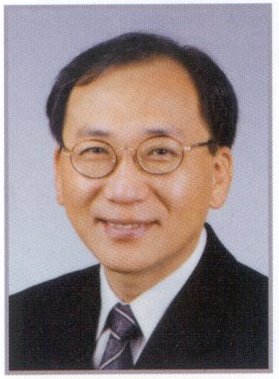 World Micromachine Summit to Open in Daejeon
The 2008 World Micromachine Summit will be held at Hotel Riviera in Daejeon for a four-day run from April 30, drawing worldwide industrial and academic leaders in the micro-nano-technology (MNT).
Organizers say that 76 delegates and 56 observers from 19 countries and regions will take part in this year"s Micromachine Summit. Prof. Cho Young-ho of the Department of Bio & Brain Engineering of KAIST will play host to the annual event.
Participants will discuss the progress of micro-nano-technology in each country and region development of national policies in this area. The Summit was first organized in 1995 by the Micromachine Center of Japan with representatives from 10 countries participating. They were Australia, Canada, Germany, Italy, Japan, the Netherlands, Switzerland, the United Kingdom, and the United States.
Korea was first invited to the conference in 1999. Since then, Korea has played an active role in promoting technological exchanges among nations and has conducted presentations and discussions on major technological breakthroughs.
During the four-day run, each delegation will outline their country"s policies and strategies and present local features on focused areas including this year"s main theme, "Micromachine towards Technology Convergence Era."
The gathering will offer a valuable opportunity for the participants to exchange and collect information on the current state of the MNT, as well as providing a forum for worldwide networking of leaders in the area.
2008.04.29 View 15389
World Micromachine Summit to Open in Daejeon
The 2008 World Micromachine Summit will be held at Hotel Riviera in Daejeon for a four-day run from April 30, drawing worldwide industrial and academic leaders in the micro-nano-technology (MNT).
Organizers say that 76 delegates and 56 observers from 19 countries and regions will take part in this year"s Micromachine Summit. Prof. Cho Young-ho of the Department of Bio & Brain Engineering of KAIST will play host to the annual event.
Participants will discuss the progress of micro-nano-technology in each country and region development of national policies in this area. The Summit was first organized in 1995 by the Micromachine Center of Japan with representatives from 10 countries participating. They were Australia, Canada, Germany, Italy, Japan, the Netherlands, Switzerland, the United Kingdom, and the United States.
Korea was first invited to the conference in 1999. Since then, Korea has played an active role in promoting technological exchanges among nations and has conducted presentations and discussions on major technological breakthroughs.
During the four-day run, each delegation will outline their country"s policies and strategies and present local features on focused areas including this year"s main theme, "Micromachine towards Technology Convergence Era."
The gathering will offer a valuable opportunity for the participants to exchange and collect information on the current state of the MNT, as well as providing a forum for worldwide networking of leaders in the area.
2008.04.29 View 15389 -
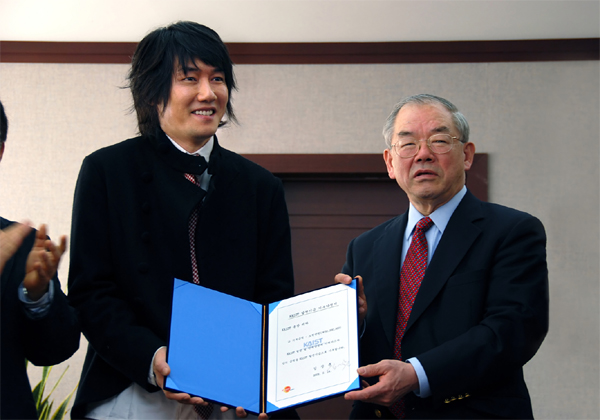 Pop Singer Kim Makes Second Donation to KAIST
Popular singer Kim Jang-Hoon donated 50 million won to KAIST for the development of Korea"s prestigious S&T university on Thursday, Feb. 14.
It was the singer"s second gift to KAIST in a year. Kim donated the same amount of money in March 2007 to express his gratitude to Professor Oh Jun-Ho and his research team for allowing him to use HUBO, South Korea"s first humanoid robot, for his concerts in 2006.
In a brief donation ceremony at the KAIST president"s office, Kim said he hoped he would be of any help in the development of science in Korea.
2008.02.18 View 14547
Pop Singer Kim Makes Second Donation to KAIST
Popular singer Kim Jang-Hoon donated 50 million won to KAIST for the development of Korea"s prestigious S&T university on Thursday, Feb. 14.
It was the singer"s second gift to KAIST in a year. Kim donated the same amount of money in March 2007 to express his gratitude to Professor Oh Jun-Ho and his research team for allowing him to use HUBO, South Korea"s first humanoid robot, for his concerts in 2006.
In a brief donation ceremony at the KAIST president"s office, Kim said he hoped he would be of any help in the development of science in Korea.
2008.02.18 View 14547 -
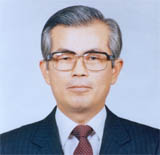 Emeritus Professor Lee Dies
Jeong-Oh Lee, Emeritus Professor of Mechanical Engineering, died of his chronic disease on June 15, 2007 at his age of 76.
The late Lee began his lecturing career at Mechanical Engineering Department in 1973 and had made considerable devotions to the education and development of mechanical engineering for 24 years. As the former Minister of Science and Technology, former President of Korea Institute of Science and Technology, and former President of Korea Advanced Institute of Science and Technology, he also has made significant contributions to the development of Korean science and technology.
Particularly, he played key roles in vitalizing Daeduk Research Complex (DRC) by planning and executing the movement of government-funded institutes despite the inactive research atmosphere in the early 1980s. He also set up the Extended Council for Technology Promotion, consisting of many distinguished persons from diverse fields under the supervision of the President, to make significant contributions to the promotion and spread of technology innovation among governmental and civil enterprises. He received Cheongjo Geunjeong Medal in 1985 and never stopped his devotion to the education of young students even after his retirement in 1997.
<Funeral Notice>- Date: Sunday, June 17, 2007 at 7 am.- Place: Eulji University Hospital, Daejeon- Graveyard: Cheonan graveyard- Bereaved family Wife Ok-Hyang Kang Son Jong-Sun Lee, Professor of Handong University Han-Sun Lee, LG Chemicals Daughter Myung-Ae Lee Son-in-law Young-Soo Lee, Korea Institute of Industrial Technology- Contact Point: C.P. 019.480.2451 (Han-Sun Lee)
2007.06.18 View 18160
Emeritus Professor Lee Dies
Jeong-Oh Lee, Emeritus Professor of Mechanical Engineering, died of his chronic disease on June 15, 2007 at his age of 76.
The late Lee began his lecturing career at Mechanical Engineering Department in 1973 and had made considerable devotions to the education and development of mechanical engineering for 24 years. As the former Minister of Science and Technology, former President of Korea Institute of Science and Technology, and former President of Korea Advanced Institute of Science and Technology, he also has made significant contributions to the development of Korean science and technology.
Particularly, he played key roles in vitalizing Daeduk Research Complex (DRC) by planning and executing the movement of government-funded institutes despite the inactive research atmosphere in the early 1980s. He also set up the Extended Council for Technology Promotion, consisting of many distinguished persons from diverse fields under the supervision of the President, to make significant contributions to the promotion and spread of technology innovation among governmental and civil enterprises. He received Cheongjo Geunjeong Medal in 1985 and never stopped his devotion to the education of young students even after his retirement in 1997.
<Funeral Notice>- Date: Sunday, June 17, 2007 at 7 am.- Place: Eulji University Hospital, Daejeon- Graveyard: Cheonan graveyard- Bereaved family Wife Ok-Hyang Kang Son Jong-Sun Lee, Professor of Handong University Han-Sun Lee, LG Chemicals Daughter Myung-Ae Lee Son-in-law Young-Soo Lee, Korea Institute of Industrial Technology- Contact Point: C.P. 019.480.2451 (Han-Sun Lee)
2007.06.18 View 18160 -
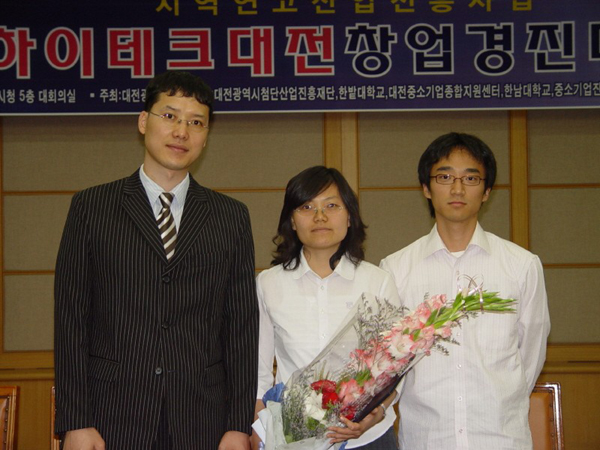 KAIST Students Wins Gold Prize at Technical Idea Contest
KAIST Students Wins Gold Prize at Technical Idea Contest
- Receive the gold prize at the 3rd High-Tech Daejeon Technical Idea Contest for Company Establishment- For the development of a new system to convert complex web page addresses to short and meaningful addresses
Sang-Hoon Kim, Song-Hwa Chae and Dong-Hun Lee of Chemical and Biomolecular Engineering won the gold prize at the prospective company establishment part in the 3rd High-Tech Daejeon Technical Idea Contest for Company Establishment on May 21 for their valuable development of ‘Web Page Address Clipping System’.
So far, simplified web page addresses include special characters, which make the addresses long and complex. That is, the current address simplification service combines meaningless random words and numerals to create addresses when web page addresses are entered. In this case, the addresses are not easy to share with others and reuse several times since they are difficult to memorize.
However, the ‘Web Page Address Clipping System’ shortens meaningless long addresses. In addition, the improved address simplification service will provide user’s own addresses, and statistics and ranking to clipping addresses frequently used.
Based on this technology, Kim and Chae are now preparing to open a company called ‘URLClip’ under the auspice of Professor Tae-Yong Yang and Researcher In-Soo Kim, KAIST Entrepreneurship Center. They are also expanding their service areas onto clipping library for individual users, host name services for enterprises, etc. and developing tool bar, RSS service (RSS is an acronym of RDF (or Rich) Site Summary. It refers to a service that automatically and easily provides frequently updated contents such as news and blogs to users), etc. to improve users’ conveniences.
URLClip (http://www.urlclip.net) is a next generation portal site, which is expected to provide a variety of individualized services based on Web Page Address Clipping Service and to be used by many enterprises as well as individual users who wish to enhance their access to useful contents.
“Chemical & Biomolecular Engineering Professor Sun-Won Park has offered lots of helps and supports, so I could decide to commercialize the developed technologies. The application of this technology to real life will allow further comfortable uses of internet to users,” Kim said.
Narae Team received the best prize last April at the 2nd Pre-Star Venture Company-Opening Contest hosted by KAIST and Hanbat Univeristy, and the technology is pending a patent application.
Inquiry:Sang-Hoon Kim, Dep. of Chemical and Biomolecular Engineering, H.P. 010-4754-9947Song-Hwa Chae, Dep. of Chemical and Biomolecular Engineering, H.P. 010-7223-9947Home page: http://www.urlclip.netEmail: urlclip@urlclip.net
2007.06.05 View 17548
KAIST Students Wins Gold Prize at Technical Idea Contest
KAIST Students Wins Gold Prize at Technical Idea Contest
- Receive the gold prize at the 3rd High-Tech Daejeon Technical Idea Contest for Company Establishment- For the development of a new system to convert complex web page addresses to short and meaningful addresses
Sang-Hoon Kim, Song-Hwa Chae and Dong-Hun Lee of Chemical and Biomolecular Engineering won the gold prize at the prospective company establishment part in the 3rd High-Tech Daejeon Technical Idea Contest for Company Establishment on May 21 for their valuable development of ‘Web Page Address Clipping System’.
So far, simplified web page addresses include special characters, which make the addresses long and complex. That is, the current address simplification service combines meaningless random words and numerals to create addresses when web page addresses are entered. In this case, the addresses are not easy to share with others and reuse several times since they are difficult to memorize.
However, the ‘Web Page Address Clipping System’ shortens meaningless long addresses. In addition, the improved address simplification service will provide user’s own addresses, and statistics and ranking to clipping addresses frequently used.
Based on this technology, Kim and Chae are now preparing to open a company called ‘URLClip’ under the auspice of Professor Tae-Yong Yang and Researcher In-Soo Kim, KAIST Entrepreneurship Center. They are also expanding their service areas onto clipping library for individual users, host name services for enterprises, etc. and developing tool bar, RSS service (RSS is an acronym of RDF (or Rich) Site Summary. It refers to a service that automatically and easily provides frequently updated contents such as news and blogs to users), etc. to improve users’ conveniences.
URLClip (http://www.urlclip.net) is a next generation portal site, which is expected to provide a variety of individualized services based on Web Page Address Clipping Service and to be used by many enterprises as well as individual users who wish to enhance their access to useful contents.
“Chemical & Biomolecular Engineering Professor Sun-Won Park has offered lots of helps and supports, so I could decide to commercialize the developed technologies. The application of this technology to real life will allow further comfortable uses of internet to users,” Kim said.
Narae Team received the best prize last April at the 2nd Pre-Star Venture Company-Opening Contest hosted by KAIST and Hanbat Univeristy, and the technology is pending a patent application.
Inquiry:Sang-Hoon Kim, Dep. of Chemical and Biomolecular Engineering, H.P. 010-4754-9947Song-Hwa Chae, Dep. of Chemical and Biomolecular Engineering, H.P. 010-7223-9947Home page: http://www.urlclip.netEmail: urlclip@urlclip.net
2007.06.05 View 17548 -
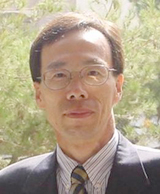 Professor Yang Named Recipient of Dupont Science & Technology Award
Professor Yang Named Recipient of Dupont Science & Technology Award
- Named as the recipient of Dupont Science & Technology Award of 2007- In recognition of his development of optical?bio-functional photonic crystal structures through Self-assembly of nanoparticles
Seung-Man Yang, a professor of Chemical and Biomolecular Engineering of KAIST (President Nam Pyo Suh) and the president of the National Creative Research Initiatives Center for Photon and Fluid Integrated Circuit by the Ministry of Science and Technology, has been named as the recipient of Dupont Science & Technology Award.
Dupont Korea, associate of Dupont, a world-class science firm, has established and conferred ‘Dupont Science & Technology Award’ since 2002 to promote basic sciences and industrial development of Korea. Dupont Science & Technology Awards are awarded to scientists of universities or state-run institutes who have made outstanding R&D achievements in the fields of Chemistry, Chemical Engineering, Material Science and Material Engineering within five years. Dupont Korea announced on May 2, 2007 that Professor Yang is the recipient of the award this year, following the strict examination by the Koran Academy of Science and Technology (KAST).
The reason for the award is Professor Yang’s development of prototype optical?bio-functional photonic crystal structures that can process a huge amount of data, resulting from a study that has discovered the principle of Self-assembly where multifunctional nanoparticles are manufactured and assembled for themselves.
Professor Yang’s recent research result about photon structures and nano patterns was published by Nature (February 2, 2006 edition); posted on Heart-Cut, the portal site of the American Chemistry Society (ACS), as highlight paper two times (November 4, 2002 and May 1, 2006); and introduced at Research/Researcher of MRS Bulletin by the U.S. Material Research Society (MRS) as main paper in December 2003. Professor Yang is very famous in Korea and abroad for the excellences of his research achievements and has made request seminars at Harvard University, University of Wisconsin, Caltech, University of California, etc. He is also invited speaker and session organizer of the MRS and the SPIE.
2007.05.08 View 21614
Professor Yang Named Recipient of Dupont Science & Technology Award
Professor Yang Named Recipient of Dupont Science & Technology Award
- Named as the recipient of Dupont Science & Technology Award of 2007- In recognition of his development of optical?bio-functional photonic crystal structures through Self-assembly of nanoparticles
Seung-Man Yang, a professor of Chemical and Biomolecular Engineering of KAIST (President Nam Pyo Suh) and the president of the National Creative Research Initiatives Center for Photon and Fluid Integrated Circuit by the Ministry of Science and Technology, has been named as the recipient of Dupont Science & Technology Award.
Dupont Korea, associate of Dupont, a world-class science firm, has established and conferred ‘Dupont Science & Technology Award’ since 2002 to promote basic sciences and industrial development of Korea. Dupont Science & Technology Awards are awarded to scientists of universities or state-run institutes who have made outstanding R&D achievements in the fields of Chemistry, Chemical Engineering, Material Science and Material Engineering within five years. Dupont Korea announced on May 2, 2007 that Professor Yang is the recipient of the award this year, following the strict examination by the Koran Academy of Science and Technology (KAST).
The reason for the award is Professor Yang’s development of prototype optical?bio-functional photonic crystal structures that can process a huge amount of data, resulting from a study that has discovered the principle of Self-assembly where multifunctional nanoparticles are manufactured and assembled for themselves.
Professor Yang’s recent research result about photon structures and nano patterns was published by Nature (February 2, 2006 edition); posted on Heart-Cut, the portal site of the American Chemistry Society (ACS), as highlight paper two times (November 4, 2002 and May 1, 2006); and introduced at Research/Researcher of MRS Bulletin by the U.S. Material Research Society (MRS) as main paper in December 2003. Professor Yang is very famous in Korea and abroad for the excellences of his research achievements and has made request seminars at Harvard University, University of Wisconsin, Caltech, University of California, etc. He is also invited speaker and session organizer of the MRS and the SPIE.
2007.05.08 View 21614 -
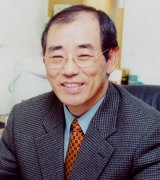 Prof. Bien Named IFSA Fuzzy Fellow
Prof. Bien Named IFSA Fuzzy Fellow
Zeungnam Bien, a professor of Electrical Engineering, has been named a Fuzzy Fellow of the International Fuzzy Systems Association (IFSA).
IFSA Fuzzy Fellows are named by the Fuzzy Fellows Committee based on the degree of technical contributions to the fuzzy set and its relevant fields and the degree of contribution for the establishment of fundaments in the field of advanced applied technologies development and fuzzy fields. IFSA has named total 36 fellows since its first one at the world congress in Prague in 1997.
Professor Bien has worked as the chairman of the IFSA and will be officially named a Fuzzy Fellowship at the IFSA World Congress at Cancun, Mexico in June.
2007.04.19 View 16334
Prof. Bien Named IFSA Fuzzy Fellow
Prof. Bien Named IFSA Fuzzy Fellow
Zeungnam Bien, a professor of Electrical Engineering, has been named a Fuzzy Fellow of the International Fuzzy Systems Association (IFSA).
IFSA Fuzzy Fellows are named by the Fuzzy Fellows Committee based on the degree of technical contributions to the fuzzy set and its relevant fields and the degree of contribution for the establishment of fundaments in the field of advanced applied technologies development and fuzzy fields. IFSA has named total 36 fellows since its first one at the world congress in Prague in 1997.
Professor Bien has worked as the chairman of the IFSA and will be officially named a Fuzzy Fellowship at the IFSA World Congress at Cancun, Mexico in June.
2007.04.19 View 16334 -
 Best Academic Award to Prof. Huen Lee
Professor Huen Lee, Department of Chemical and Biomolecular Engineering, received the Best Prize of KAIST Academic Awards at the 36th anniversary ceremony of KAIST.
Professor Lee has published 43 international papers and 12 domestic papers for the past five years and achieved world’s distinguished academic performances such as the development of hydrogen storage technologies, the discovery of the principle on carbon dioxide-methane hydrate swapping, etc.
Professor Lee published his paper on methane hydrate at Science in 2003, and Nature introduced his paper on hydrate storage technologies as ‘highlight research’ in 2005, commenting his research as a landmark performance to pave ways for the development of future hydrogen energy. His discovery on ‘the principle of carbon dioxide-methane hydrate swapping’, published by PNAS in 2006, also gained huge attraction across the world as one of the promising technologies that can solve energy problem and global warming crisis simultaneously.
Meanwhile, the rest of the awardees of 2007 are as follows:
- Academic Award: Professor Jongkyeong Chung, Dep. of Biological SciencesAssociate professor Changok Lee, Dep. of MathematicsAssociate professor Sangkyu Kim, Dep. of ChemistryProfessor Dae-gab Gweon, Dep. of Mechanical Engineering
- Creative Lecture Award: Associate professor Jaehung Han, Dep. of Aerospace Engineering
- Excellent Lecture Award: Assistant profess Bong Gwan Jun, School of Humanities & Social Science Professor Joonho Choe, Dep. of Biological Sciences Professor Changwon Kang, Dep. of Biological Sciences Professor Seunghyup Yoo, Div. of Electrical Engineering Associate professor Otfried Cheong, Div. of Computer Science Professor Hoe Kyung Lee, Graduate School of Finance
- Contribution Award: Professor Sung Chul Shin, Dep. of Physics Professor Bowon Kim, Graduate School of Culture Technology Professor Jisoo Kim, Graduate School of Finance
- International Cooperation Best Award: Professor Hyung Suck Cho, Dep. of Mechanical Engineering
- International Cooperation Award: Professor Kunpyo Lee, Dep. of Industrial Design Professor Soon Hyung Hong, Dep. of Materials Science & Engineering Professor Sungjoo Park, Graduate School of Culture Technology
2007.03.19 View 21092
Best Academic Award to Prof. Huen Lee
Professor Huen Lee, Department of Chemical and Biomolecular Engineering, received the Best Prize of KAIST Academic Awards at the 36th anniversary ceremony of KAIST.
Professor Lee has published 43 international papers and 12 domestic papers for the past five years and achieved world’s distinguished academic performances such as the development of hydrogen storage technologies, the discovery of the principle on carbon dioxide-methane hydrate swapping, etc.
Professor Lee published his paper on methane hydrate at Science in 2003, and Nature introduced his paper on hydrate storage technologies as ‘highlight research’ in 2005, commenting his research as a landmark performance to pave ways for the development of future hydrogen energy. His discovery on ‘the principle of carbon dioxide-methane hydrate swapping’, published by PNAS in 2006, also gained huge attraction across the world as one of the promising technologies that can solve energy problem and global warming crisis simultaneously.
Meanwhile, the rest of the awardees of 2007 are as follows:
- Academic Award: Professor Jongkyeong Chung, Dep. of Biological SciencesAssociate professor Changok Lee, Dep. of MathematicsAssociate professor Sangkyu Kim, Dep. of ChemistryProfessor Dae-gab Gweon, Dep. of Mechanical Engineering
- Creative Lecture Award: Associate professor Jaehung Han, Dep. of Aerospace Engineering
- Excellent Lecture Award: Assistant profess Bong Gwan Jun, School of Humanities & Social Science Professor Joonho Choe, Dep. of Biological Sciences Professor Changwon Kang, Dep. of Biological Sciences Professor Seunghyup Yoo, Div. of Electrical Engineering Associate professor Otfried Cheong, Div. of Computer Science Professor Hoe Kyung Lee, Graduate School of Finance
- Contribution Award: Professor Sung Chul Shin, Dep. of Physics Professor Bowon Kim, Graduate School of Culture Technology Professor Jisoo Kim, Graduate School of Finance
- International Cooperation Best Award: Professor Hyung Suck Cho, Dep. of Mechanical Engineering
- International Cooperation Award: Professor Kunpyo Lee, Dep. of Industrial Design Professor Soon Hyung Hong, Dep. of Materials Science & Engineering Professor Sungjoo Park, Graduate School of Culture Technology
2007.03.19 View 21092 -
 Singer Janghoon Kim Donates Development Fund to KAIST
Singer Janghoon Kim Donates Development Fund to KAIST
- Generously donates part of earnings from his concert where HUBO performed for development of science
- Opportunity for activation of science culture through encounter between science and culture
Singer Janghoon Kim donated 50 million won from his concert earnings for KAIST development fund.
Singer Kim visited KAIST on January 16 (Tue) and donated the development fund at the joint lecture room in KAIST Mechanical Engineering B/D.
Singer Kim had a concert at the end of the last year where he performed with ‘HUBO’ and ‘Albert HUBO’, human-like robots of KAIST HUBO center.
Singer Kim made a donation to express his gratitude to KAIST Professor Joonho Oh and his research team, who assisted his concert actively to allow HUBO to join the concert in spite of technical difficulties and research obstacles.
“Although HUBO has performed various activities so far, it is the first time to make a successful performance with a singer on a stage. Honestly, I hesitated a lot to allow HUBO to join Kim’s concert due to safety problems etc., but I was so impressed by Kim’s interest and passion for science, and thus decided HUBO’s joining the concert. This is the first case how robots can exchange with public cultures. I wish this case will be a momentum to activate science culture and make people feel closer to science,” Professor Oh said.
The donation will be spent partly as KAIST development fund (20 million won) and partly on the publicity of science and technology via HUBO (30 million won).
2007.01.23 View 15576
Singer Janghoon Kim Donates Development Fund to KAIST
Singer Janghoon Kim Donates Development Fund to KAIST
- Generously donates part of earnings from his concert where HUBO performed for development of science
- Opportunity for activation of science culture through encounter between science and culture
Singer Janghoon Kim donated 50 million won from his concert earnings for KAIST development fund.
Singer Kim visited KAIST on January 16 (Tue) and donated the development fund at the joint lecture room in KAIST Mechanical Engineering B/D.
Singer Kim had a concert at the end of the last year where he performed with ‘HUBO’ and ‘Albert HUBO’, human-like robots of KAIST HUBO center.
Singer Kim made a donation to express his gratitude to KAIST Professor Joonho Oh and his research team, who assisted his concert actively to allow HUBO to join the concert in spite of technical difficulties and research obstacles.
“Although HUBO has performed various activities so far, it is the first time to make a successful performance with a singer on a stage. Honestly, I hesitated a lot to allow HUBO to join Kim’s concert due to safety problems etc., but I was so impressed by Kim’s interest and passion for science, and thus decided HUBO’s joining the concert. This is the first case how robots can exchange with public cultures. I wish this case will be a momentum to activate science culture and make people feel closer to science,” Professor Oh said.
The donation will be spent partly as KAIST development fund (20 million won) and partly on the publicity of science and technology via HUBO (30 million won).
2007.01.23 View 15576 -
 KAIST Alumni Awards of the Year 2006
KAIST Alumni Awards of the Year 2006
Byung-Kyu Chang, Jin-Gon Kim, Sin-Bae Kim, and Sang-Ki Rhee (From left)
KAIST Alumni Association (Chairman Sam-Soo Pyo, CEO of Oracle Korea) named the recipients of ‘KAIST Alumni Awards of the year 2006’ and conferred the awards at its New Year’s Greetings, which was held at Grand Ballroom in JW Marriott Hotel, Saturday, January 13.
KAIST Alumni Awards of the Year were conferred on ▲ Byung-Kyu Chang, CEO of Cheot-noon Inc., at the young alumni section, ▲ Jin-Gon Kim, Professor of POSTECH, at the academy section, ▲ Sin-Bae Kim, CEO of SK Telecom, at the industry section, and ▲ Sang-Ki Rhee, President of Korea Research Institute of Bioscience & Biotechnology (KRIBB), at the society section.
The young alumni section winner Byung-Kyu Chang, Master of KAIST Computer Sciences (Class ‘97), has jointly created Neowiz, Korea’s typical internet venture company, and created Cheot-noon Inc., internet-searching company, to substantially contribute to the development of Korea’s IT industries.
The academy section winner Jin-Gon Kim, Master of KAIST Chemical Engineering (Class ‘82), has made great research achievements in nano field, such as the development of high molecular tube theory, etc.
The industry section winner Sin-Bae Kim, Master of KAIST Industrial Engineering (Class ‘80), has contributed to the development of mobile communication and information system industries with his outstanding technology management capabilities and shown excellent models to junior engineers with his creative managing philosophies.
The society section winner Sang-Ki Rhee, Ph.D of KAIST Chemical & Biomolecular Engineering (Class ‘80), has contributed to the development of practicalization technologies in genetic engineering field and the government’s establishment of biotechnology policies, and created large-scaled research performances through management renovation during his reign as the president of KRIBB.
‘KAIST Alumni Award of the Year’, the greatest honor of KAIST alumni, was established in 1992 to encourage alumni’s activities by yearly awarding alumni who contribute to the development of the nation and the society and raise the fame of alma mater.
2007.01.22 View 16610
KAIST Alumni Awards of the Year 2006
KAIST Alumni Awards of the Year 2006
Byung-Kyu Chang, Jin-Gon Kim, Sin-Bae Kim, and Sang-Ki Rhee (From left)
KAIST Alumni Association (Chairman Sam-Soo Pyo, CEO of Oracle Korea) named the recipients of ‘KAIST Alumni Awards of the year 2006’ and conferred the awards at its New Year’s Greetings, which was held at Grand Ballroom in JW Marriott Hotel, Saturday, January 13.
KAIST Alumni Awards of the Year were conferred on ▲ Byung-Kyu Chang, CEO of Cheot-noon Inc., at the young alumni section, ▲ Jin-Gon Kim, Professor of POSTECH, at the academy section, ▲ Sin-Bae Kim, CEO of SK Telecom, at the industry section, and ▲ Sang-Ki Rhee, President of Korea Research Institute of Bioscience & Biotechnology (KRIBB), at the society section.
The young alumni section winner Byung-Kyu Chang, Master of KAIST Computer Sciences (Class ‘97), has jointly created Neowiz, Korea’s typical internet venture company, and created Cheot-noon Inc., internet-searching company, to substantially contribute to the development of Korea’s IT industries.
The academy section winner Jin-Gon Kim, Master of KAIST Chemical Engineering (Class ‘82), has made great research achievements in nano field, such as the development of high molecular tube theory, etc.
The industry section winner Sin-Bae Kim, Master of KAIST Industrial Engineering (Class ‘80), has contributed to the development of mobile communication and information system industries with his outstanding technology management capabilities and shown excellent models to junior engineers with his creative managing philosophies.
The society section winner Sang-Ki Rhee, Ph.D of KAIST Chemical & Biomolecular Engineering (Class ‘80), has contributed to the development of practicalization technologies in genetic engineering field and the government’s establishment of biotechnology policies, and created large-scaled research performances through management renovation during his reign as the president of KRIBB.
‘KAIST Alumni Award of the Year’, the greatest honor of KAIST alumni, was established in 1992 to encourage alumni’s activities by yearly awarding alumni who contribute to the development of the nation and the society and raise the fame of alma mater.
2007.01.22 View 16610 -
 KAIST President's Advisory Council starts to operate
KAIST President’s Advisory Council starts to operate
Composed of distinguished experts (six from abroad and seven from home) in the fields of industry, academy, and research
To suppose development plan, provide political advices, and help fund-raising
Consultation by distinguished experts from home and abroad starts to make KAIST (President Nam-Pyo Suh) one of world’s top technology and science universities.
KAIST held the first meeting of KAIST President’s Advisory Council (PAC), which has been composed for consultation over KAIST development plan (draft), at KAIST conference room, Wednesday, November 8, 2006.
At the meeting, general introduction of KAIST and presentation of business plan by each college were made, and KAIST Education Innovation Center’s undergraduate education innovation plan (draft) and research plan by each of five KAIST institutes were explained. At the meeting, the PAC members discussed items to be carried out for the development plan (draft) and advised substantial measures to achieve the goals. After the meeting, the PAC members visited two laboratories to observe research sites.
KAIST PAC is composed of celebrities possessing rich global management experiences at the top of the fields of industry, academy, and research from home and abroad and will perform various substantial roles such as suggesting development plans, providing political advices, and assisting fund-raising to advance KAIST into one of the world’s top 10 universities.
The overseas members of KAIST PAC are Neil Pappalardo, Chairman of MEDITECH, Hock Tan, Chairman of Technology Inc., Hiroyuki Yoshikawa, President of Japanese Institute of Advanced Industrial Science and Technology and former president of Tokyo University, John Holzrichter, President of Fannie and John Hertz Foundation, Jongmoon Lee, Chairman of AmBex Inc., and Byungjoon Park, CEO of Bureau Veritas CPS.
And, the domestic members of KAIST PAC are Kyesik Min, Vice-chairman of Hyundai Heavy Industries, Heekuk Lee, President of LG Electronics, Youngchul Hong, Chairman of KISWIRE, Heebum Lee, Chairman of Korean International Trade Association, Yoonwoo Lee, Vice-chairman of Samsung Electronics, Dongjin Kim, Vice-chairman of Hyundai Motors, Youngsik Myung, President of GS CALTEX.
2006.11.14 View 15072
KAIST President's Advisory Council starts to operate
KAIST President’s Advisory Council starts to operate
Composed of distinguished experts (six from abroad and seven from home) in the fields of industry, academy, and research
To suppose development plan, provide political advices, and help fund-raising
Consultation by distinguished experts from home and abroad starts to make KAIST (President Nam-Pyo Suh) one of world’s top technology and science universities.
KAIST held the first meeting of KAIST President’s Advisory Council (PAC), which has been composed for consultation over KAIST development plan (draft), at KAIST conference room, Wednesday, November 8, 2006.
At the meeting, general introduction of KAIST and presentation of business plan by each college were made, and KAIST Education Innovation Center’s undergraduate education innovation plan (draft) and research plan by each of five KAIST institutes were explained. At the meeting, the PAC members discussed items to be carried out for the development plan (draft) and advised substantial measures to achieve the goals. After the meeting, the PAC members visited two laboratories to observe research sites.
KAIST PAC is composed of celebrities possessing rich global management experiences at the top of the fields of industry, academy, and research from home and abroad and will perform various substantial roles such as suggesting development plans, providing political advices, and assisting fund-raising to advance KAIST into one of the world’s top 10 universities.
The overseas members of KAIST PAC are Neil Pappalardo, Chairman of MEDITECH, Hock Tan, Chairman of Technology Inc., Hiroyuki Yoshikawa, President of Japanese Institute of Advanced Industrial Science and Technology and former president of Tokyo University, John Holzrichter, President of Fannie and John Hertz Foundation, Jongmoon Lee, Chairman of AmBex Inc., and Byungjoon Park, CEO of Bureau Veritas CPS.
And, the domestic members of KAIST PAC are Kyesik Min, Vice-chairman of Hyundai Heavy Industries, Heekuk Lee, President of LG Electronics, Youngchul Hong, Chairman of KISWIRE, Heebum Lee, Chairman of Korean International Trade Association, Yoonwoo Lee, Vice-chairman of Samsung Electronics, Dongjin Kim, Vice-chairman of Hyundai Motors, Youngsik Myung, President of GS CALTEX.
2006.11.14 View 15072